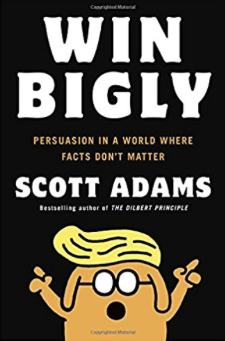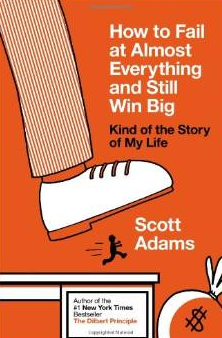I recently read “Loserthink: How Untrained Brains Are Ruining America” by Scott Adams. Below are the quotes I found most interesting (with Kindle page numbers.) If you like the quotes, buy the book.
The risk of mockery changes behavior. I would go so far as to say it is one of history’s most powerful forces. Location 104-105
If all you know is how many times someone hit a target, it is loserthink to judge how accurate they are. You also need to know how many times they missed. Location 219-221
it is a bad idea to trust the majority of experts in any domain in which both complexity and large amounts of money are involved. Location 224-224
When lots of money and lots of complexity are in play, fraud is nearly guaranteed. Location 231-232
it is nearly impossible to mock a good idea unless you also lie about its nature or leave out important context. Mockery only succeeds in persuading against absurd beliefs. Location 290-291
The technological change that broke the news business was our ability to measure audience reaction to every headline and every variation of every story. Once you can reliably measure the income potential of different approaches to the news, the people who manage the news have to do what works best for profitability or else they are abandoning their responsibilities to shareholders. On top of that, executive compensation is determined by profit performance. From the moment technology allowed us to know which kinds of content influenced viewership the most, the old business model of the news industry was dead media walking. Location 328-332
Being absolutely right and being spectacularly wrong feel exactly the same. Location 357-358
You and I are often penalized for what other people think we are thinking. Location 379-379
If you are certain you know the inner thoughts of a stranger, that’s a sign you might have too much confidence in your opinion. Location 413-414
If you are dismissing your critics with labels they would not assign to themselves, you might be engaged in loserthink. Location 462-462
People who have good arguments use them. People who do not have good arguments try to win by labeling. Location 464-464
No matter the topic, all sides typically believe they have the right facts and the other side is delusional. Location 491-492
The productive way to think of your ego is to consider it a tool, as opposed to a reflection of who you are on some core level. Location 501-502
If you think your ego is a tool, you can choose to dial it up when needed and dial it down when it would be an obstacle. Location 502-503
The sweet spot for self-confidence involves operating with a belief that you can do more than the available evidence suggests, but not so much more that it would be crazy. Location 505-506
The world is not a fair place, and there is a good chance the people you are dealing with did not get to where they are because of their intelligence, hard work, and character. Location 514-515
Learn how to breathe properly, inhaling through your nose, exhaling through your mouth, and lowering your diaphragm when you inhale, as opposed to shallow breathing in your chest. Location 523-524
Effectiveness is more important than ego. Location 610-610
Note how other people’s embarrassments mean little to you when you are an observer. That’s how much your embarrassments mean to them: nothing. Location 654-655
When you combine a human brain that is wired to notice problems with a press that is incentivized to present stories involving huge problems, you can easily start imagining that the world is falling apart in a variety of fatal ways. And that worldview might limit your ability to appreciate all the things going right. Location 687-688
It is helpful to think of your mind as having limited shelf space. If you fill that space with negative thoughts, it will set your mental filters to negativity and poor health, and there will be no space left for healthy, productive, and uplifting thoughts. Location 703-705
The thoughts you allow into your head are the code that programs your mind and body. Location 708-709
If you are having trouble keeping negative thoughts from your mind, don’t try to “not think” about them. That just makes you think about them more. Instead, find the most positive and “sticky” thoughts you can imagine, and focus on them until your mental shelf space is filled. Location 717-719
As a rule, we can’t always tell the difference between the people who are far smarter than us and the people who are dumber. Both groups make choices we can’t understand. Location 738-739
One of the most normal situations in the world is that people like the same thing (in this case Las Vegas) for wildly different reasons. In politics too, people can support the same candidate for wildly different reasons. Location 784-785
The first way history is not real is that whoever is in charge gets to write history any way they like. And the way they like it is whatever way keeps them in power and looking awesome. Location 816-818
Every government invents its own version of history to brainwash their population. Location 827-828
We are raised to assume we are the lucky ones who learn accurate history while evil leaders elsewhere are duping their citizens. I hope you can see how unlikely it is that any country is presenting history to its children in an objective way. Location 828-830
The trouble happens when people try to manage events in the present to fix the past. Location 850-851
From a persuasion perspective, history can be a useful tool. If I can make you feel guilty for something your demographic group did to mine, I might be able to influence you in a way that is good for me. Location 852-853
In the long run, nothing persuades like success. Location 872-872
Our tiny brains don’t have the capacity to grasp the complexities of life and then process that knowledge to make smart decisions. We only think we can. Location 893-894
What we do instead of rational decision-making is employ a sloppy form of pattern recognition to make sense of our world. Location 894-895
We can’t tell the difference between valid patterns that might predict something useful and something that simply reminds us of something else but means nothing. Location 899-900
We humans are not good at knowing which history is the one that will repeat. Location 928-929
Life is messy and complicated, and the situations we encounter often remind us of multiple histories. But which of those histories is the one that is predictive? Location 929-930
History repeats until it doesn’t. And you never know when the “doesn’t” phase starts. Location 946-946
Belief in slippery slopes is loserthink. It is more useful to look at forces and counterforces to see where things are likely to end up. Location 1001-1002
Whoever is hired to work on the new version of the software will call the person who worked on the last version an idiot. Location 1063-1063
Whenever you are talking to an expert in any realm, be aware that the next expert is likely to tell you the work done by the last expert looked like a monkey pounding a keyboard with a banana. And the expert after that will be just as rough on the prior expert, all the way to infinity. If experts are routinely skeptical of other experts, shouldn’t you be skeptical of experts too? Location 1070-1072
The best solution to a problem is often unrelated to who is at fault. Location 1103-1103
You can often know you are heading in the right direction, which matters a lot, while the precision of your estimates is secondary. Location 1164-1165
Both sides are right about the other being irrational, but wrong about themselves being rational. Location 1183-1183
The more you care about a topic, the more susceptible you are to assigning meaning to coincidences. Location 1298-1298
If you are genuinely trying to understand the world, please avoid judging entire groups by their worst members. Location 1340-1341
The business model of the free press depends on reinforcing the ideas that each side of the political divide in the United States is as bad as the worst 5 percent. Location 1342-1343
If I had to pick one defining characteristic that separates the successful from the unsuccessful, it would be luck. But if I had to pick two defining characteristics, the other one would be a sense of control. Successful people, and people who will someday be successful, seem to believe they can steer their fate by their actions. Whether they are right about that or not, it’s a winning mindset. People who think they control their situations will put more effort into doing so. Location 1456-1459
If you take full responsibility for your outcomes, even while knowing much of it depends on luck, that’s how rich people think. Location 1472-1473
Certainty isn’t a good indication of rightness for any complicated situation. Location 1504-1504
Capitalism is similar to both science and fishing in that it is largely a failure machine. Most startups fail, for example, and most companies eventually go out of business, one way or another. But while all that failing is happening, employees are getting paid, vendors are selling products and services to the doomed business while it lasts, and the economy chugs along. You only need a small percentage of companies to succeed in order to have a strong economy. Location 1512-1515
The reality is that entrepreneurs are making educated guesses and talking themselves into a degree of certainty that the facts do not support. Location 1517-1518
Being wrong and yet confident is a good description of the human condition. Location 1520-1520
Our irrational confidence makes sense if you assume humans evolved to have traits that help us survive. Our world rewards action over inaction, Location 1525-1526
Real experts are likely to give you advice that is similar or at least compatible. Location 1597-1597
When people ask you if the ends justify the means, they are trying to frame themselves as the moral player in the conversation while framing you as the unethical weasel. Don’t answer the trick question. Instead, restate the question in this form before answering: I think you mean: Are the benefits greater than the costs? Location 1607-1609
The best response to a bad analogy is to say you don’t address analogies because those are different situations by definition, but you would be happy to address the costs and benefits around your topic. Location 1622-1624
In the business world, a project that doesn’t pay for itself in two to three years is generally a bad idea. Location 1736-1737
We humans are not good at predicting. And any notion that we have developed that superpower, in light of all observations to the contrary, is pure loserthink. Location 1800-1801
In general, when you see a lot of energy in a particular area, spread across multiple companies, the technology or industry is likely to stay around even if the players change. Location 1811-1813
Don’t assume you can tell the difference between actual knowledge and your own confirmation bias. Location 2025-2025
A more productive way of thinking about your experience in this life is that you are what you do. Location 2030-2031
Dwelling on the negative is expensive in terms of your social life, your mental health, and even your career success. People like to be around positive people, for all the right reasons. Location 2036-2037
if I need to talk about something negative, I pair it with at least one positive thought. Location 2040-2040
Never be yourself if you can make yourself into something better through your conscious actions. You are what you do. Location 2046-2047
Every culture has its own feelings about success. I call that cultural gravity. If your culture celebrates success, you have low cultural gravity, and you can rise according to your talents and efforts. But if your culture disapproves of success, you’ll feel it dragging you back to earth every time you try to succeed. Location 2444-2446
If you allow the opinions of unsuccessful people in your culture to hold you back, you’re engaged in loserthink. Location 2467-2468
Waiting until you know how to do something exactly right is a poor strategy. You could be waiting forever. Better to jump in, make your mistakes, and see what kind of free assistance that attracts. Location 2476-2478
We are a species that makes one irrational decision after another and then we cover our tracks by concocting “reasons” after the fact. In other words, we are not so much a rational species as a species that experiences the illusion of being rational. Location 2623-2625
Your persistent belief in your own rationality is the primary illusion that controls your life. Location 2626-2627
One big problem with judging people by their mistakes is that what you are actually doing is judging people by the mistakes you are aware of. The people you have judged to be angels might simply be better, or luckier, at getting away with their transgressions against humanity. That would result in an inaccurate ranking of human beings on your personal judgment scale. There’s no point in being a judgmental person if you can’t accurately rank people. That’s just guessing. Location 2668-2671
The Twenty-Year Rule Let’s stop blaming each other for things that happened more than twenty years ago. Humans change a lot in two decades. Location 2762-2763
Once you learn to embrace the realization that being right and being wrong feel exactly the same, you’re halfway out of your mental prison. Location 2812-2813
State ONE thing you believe on this topic that you think I do NOT believe. Location 2854-2854
When people are experiencing cognitive dissonance and confirmation bias (which is our normal human state), they tend to use what I call laundry list persuasion. That happens when none of the evidence is persuasive on its own, so there is an attempt to make up for the shortfall with quantity. The idea here is that if one piece of evidence has zero credibility, ten pieces of evidence with zero credibility add up to something real. Location 2869-2871
Always talk first about the points on which you agree, to set the tone and establish yourself as a reasonable voice. Location 2888-2889
You, rather than pointing out the omission, ask your critic to describe what the future would look like under their preferred plan. Location 2911-2911
If you liked the quotes, buy the book.





